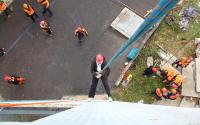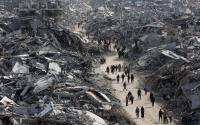7 September 2005David McNeill
What lies behind a series of over-the-top police interventions against antiwar activists?Venerated by neonationalists and marinated in over a century of militarism and war, Yasukuni Shrine may well be Japan's least friendly venue for a demonstration by pacifists.Still, every August 15, small groups of Christians, radicals and antiwar campaigners come here to stage token protest against visits to the shrine by prominent politicians.The activists range in age from 19 to 90 and seldom carry anything more dangerous than white flags and placards, which is why they were stunned last month when the police waded in and arrested six of their members. Dressed in full riot gear, the police aggressively wielded batons and fists against people who were posing no threat to anyone, claim the activists. "One of our members was 90-year-old Mr. Oshima, and he was handled very roughly," says Reverend Hoshiyama Kyoko of the United Church of Christ, Japan's largest protestant group, which led a protest of about 150 people."We approached from Chidorigafuchi Park and the police just blocked our way. It was very surprising because the police know we just walk around the shrine holding white handkerchiefs. We negotiated to walk on the footpath but another group of police surrounded us and prevented us from moving."So we started speeches there, with speakers from Korea and America. The police grabbed two members of our group."
Another group of about 50 activists came up from Kudanshita Station to find "a sea of police" in riot gear blocking their way. "It was more police than we had ever seen," says protestor Amakasu Tomoko.The protestors claim they were jostled, kicked and punched as they tried to get to the shrine, where they intended to shout antiwar slogans during the traditional one-minute silence at noon; four -- including a law student and a musician -- were grabbed and held with the other two arrestees, without charge, for12 days. The arrest actions provoked little press reaction, except for small news stories based exclusively on police reports. Inside the shrine grounds, thousands of people listened to speeches by Tokyo Governor Ishihara Shintaro, LDP acting General Secretary Abe Shinzo and other nationalist speakers; the Yomiuri and Sankei newspapers had pushed for 200,000 people to pay their respects on the 60th anniversary of the end of World War II, and this figure was widely reported in the press. As always on August 15, the shrine was serenaded by martial music from dozens of ultra-nationalist sound trucks and heavily ringed by thousands of police. Hardly a venue, in other words, likely to be seriously threatened by at most 500 mostly middle-aged pacifists. But the authorities disagree."The people we arrested carried placards and were shouting as they approached the shrine," said a spokesman for the Kudanshita authorities. That makes it a demonstration, for which they did not have permission. There were hundreds of uyoku at the shrine, so we moved in to prevent a riot."
Most of the campaigners, however, have difficulty accepting the claim that the police acted to protect them from ultra-nationalists. "The peace group has been going to Yasukuni for ten years and nobody has been arrested," says Watanabe Konosuke, who works for a non-government legal resource center that is helping the activists.He says the protestors were repeatedly attacked by ultra-nationalists but the police never intervened before either to protect the protestors or to arrest them. "The police know the rightists from judo and kendo clubs. They're only interested in us."
One of the arrested six, Yagi Wataru, says he was shocked by the behavior of the police, and the way the incident was reported afterwards. "The newspapers called it an illegal demonstration, but we were just walking from the station when the police came. They hit us with their shields, punched us and grabbed our throats. People were screaming."He claims that after his arrest he was interrogated for 5 hours a day. "The police said we were insulting those who died in the war, and that our activities were meaningless because the shrine wasn't going to go away. They shouted that they knew where I worked and threatened to arrest me again next year."The police deny any verbal abuse. "Why are you investigating such a trivial incident when there are much more serious things to attend to," said the spokesman, visibly irritated at the question. The Yasukuni arrests follow the successful prosecution of Kinoshita Masaki last year after he sprayed a public toilet wall in Suginami-ku in Tokyo with antiwar slogans. The prosecuting judge in the case said that Kinoshita had "spoiled the beauty of the toilet, making users uncomfortable and unhappy."In December last year, three peace activists narrowly escaped six months in prison for distributing handbills arguing against the dispatch of Self-Defense Force troops to Iraq in an SDF housing complex in Tachikawa. The public prosecutors argued that it was illegal for the activists to have "entered other people's property without permission from the management," an accusation that left distributors of fliers for pizza parlors and hair salons across the country quaking in their boots. The three activists were held for 75 days, earning them a "prisoners of conscience" label from Amnesty International, before Hachioji district Judge Hasegawa Kenichi dismissed the charge. Hasegawa called the arrest "questionable" and said that freedom of expression was guaranteed by Article 21 of the Constitution. What explains this sledgehammer approach to Japan's dwindling ranks of aging pacifists -- the three activists were members of a tiny 7-member Tachikawa-based group that has been leafleting the SDF complex for over two decades? Activists believe that someone, somewhere in government has decided to get tough, pointing for instance to the fact that the Tachikawa case was pursued by the public security division of the Metropolitan Police, and not the local police. "The government is trying to make a point, that they can get people like us," says one of the Tachikawa-7, who claims his life was put on hold by the investigation and requested anonymity. "We believe it is aimed at destroying the remaining citizens' peace movements and laying the groundwork for the revision of Article 9 of the Constitution. We're a small thorn in their side."The Tachikawa group tells the same story of rough police tactics, well in excess of any motivation to uncover 'crimes.' "The interrogations lasted hours every day, with the police constantly saying: "If you keep this up you'll be fired, and "why don't you leave [the group].' They called our homes and workplaces, asked personal questions about our pasts and what we did. It was intimidation, not investigation." Reverend Hoshiyama, who helped launch the Yasukuni Tennosei Mondai Joho Center (Information Center on Yasukuni and the Emperor System), around the time of the 1989 death of the Showa Emperor, in an attempt to bring Japan's undigested historical issues into the open, believes this year's clampdown was very significant. "So much has happened since we did this ten years ago for the 50th anniversary: the flag and anthem law, the dispatch of the SDF, the attempt to revise the Constitution. These people want to remake Japan, and Yasukuni has such huge significance for them." "Even the so-called liberal Asahi led with a full-page story on the end of the war, and mostly ignored us. We have to fight back otherwise they will have it all their way."
David McNeill is a Tokyo-based journalist who teaches at Sophia University. A regular contributor to a number of publications, including the London Independent and is a columnist for OhMy News, he is a Japan Focus Coordinator. This is a slightly revised version of an article that appeared in The Japan Times on September 6, 2005.
http://www.zmag.org/content/showarticle.cfm?SectionID=17&ItemID=8690






